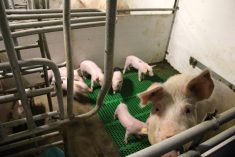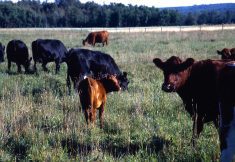As a farmer, who grows soybeans, wheat and canola in Manitoba and as a leader in the sector as chair of Soy Canada, I am compelled to raise my voice publicly, as agriculture affects all Canadians.
The outcome of this election will shape our nation over the next four years. We need a government with a plan to unite Canadians around a strong and healthy agriculture sector. Farmers, those who work in the industry and consumers are listening and waiting for our candidates’ responses.
I watched the agricultural debate co-ordinated by the Canadian Federation of Agriculture on September 24. It was disappointing. It failed to address the concerns raised here and it was heavy on rhetoric and light on substance.
Read Also

Canada’s interprovincial trade push makes for strange allies
Breaking down interprovincial trade barriers has become a national group project among Canada’s provincial governments, and that’s made for some strange alliances
The agriculture and agri-food sectors are significant to the Canadian economy. I like to reference the numbers from the 2017 Advisory Council on Economic Growth, led by the recently appointed Canadian ambassador to China, Dominic Barton. He noted the sector accounted for 2.1 million direct and indirect jobs, and contributed 6.7 per cent of Canadian gross domestic product (GDP). These are impressive numbers.
Again, I ask, where is agriculture in this election?
As a farmer, I pride myself on being able to grow quality products for a domestic and global consumer base. I am able to sell my crop at today’s numbers or shop for the best contracts available, but I am not able to set my own prices, nor am I able to predict the weather or forecast political interference.
The Canadian agriculture sector relies on exports and trade with the global community to thrive. The 2017 Agri-Food Economic Strategy Table called for $85 billion in exports by 2025, an increase from $64.6 billion in 2017. This growth will not occur by simply following the status quo. I believe the largest obstacle to reaching this goal is trade barriers. These barriers are increasing and becoming more complex. And these barriers and the resulting decrease of GDP will affect all Canadians, reducing exports and Canadian jobs. The federal campaigns need to address this.
Canadian farmers have been shut out of one of the biggest markets in the world; China. China was once one of the leading importers of Canadian canola, soybeans, pork and beef. The impact of this was felt immediately, but the ultimate cost to the sector still hangs in the balance of Canada’s response to it.
Canadian steel received a $100-million bailout from the federal government. Canada’s oil industry also received a multibillion-dollar bailout when the federal government purchased a pipeline from Kinder Morgan. The Canola Council of Canada has estimated the loss of the Chinese market will be a $1-billion blow to the canola industry. Producer prices for soybeans are well below those of one year, five years and 10 years ago. Where is our support? Why is the agriculture sector absorbing the full cost of political disputes over which it has no control?
There is no doubt in my mind that farmers have been impacted by the arrest of Meng Wanzhou, CFO of Chinese telecommunications giant Hauwai. This has made Canada’s once vibrant trade relationship with China collateral damage in a dispute that is political in nature. Canadian farmers have been impacted by politics.
China initially threatened, and subsequently implemented, a 25 per cent retaliatory import tariff on U.S. soybeans. Mirroring the evolving political rhetoric, futures prices on the Chicago Board of Trade (CBOT) fell by 25 per cent between May and July 2018. Prices in Canada are based on the CBOT futures. We felt this. Farmers are still feeling this. It hurts. Think of the impact a 25 per cent increase in interest rates would do to the consumer’s mortgage. This is the impact I feel on my prices. The interest rate increase would lead to higher mortgage payments. I suffer a reduction in income. Both hurt.
As a Canadian farmer, I am prepared to assume my responsibility for the welfare of this country and I will strive to have a positive impact on the environment and climate change. I will compete with the best in the world in terms of value, price, quality and quantity in order to sell my products.
I am prepared to deal with weather, market fluctuations and increasing costs of production. But, on my own I cannot deal with political influence.
Let’s do our part to ensure Canada’s agriculture sector is as strong and as healthy as possible.
Join me in asking, where is agriculture in this election?
Ernie Sirski is chair of the board of directors of Soy Canada and he farms in the Dauphin area.


















